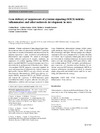Please use this identifier to cite or link to this item:
https://accedacris.ulpgc.es/jspui/handle/10553/75283
| Title: | Gene delivery of suppressors of cytokine signaling (SOCS) inhibits inflammation and atherosclerosis development in mice | Authors: | Recio Cruz, Carlota Pilar Oguiza, Ainhoa Mallavia, Beñat Lazaro, Iolanda Ortiz-Muñoz, Guadalupe Lopez-Franco, Oscar Egido, Jesus Gomez-Guerrero, Carmen |
UNESCO Clasification: | 3207 Patología | Keywords: | SOCS JAK STAT Atherosclerosis Inflammation, et al |
Issue Date: | 2015 | Project: | SAF2012-38830 FIS PI10/00072 |
Journal: | Basic Research in Cardiology | Abstract: | Chronic activation of Janus kinase/signal transducers and activators of transcription (JAK/STAT) pathway contributes to vascular inflammation and atherosclerosis by inducing expression of genes involved in cell proliferation, differentiation and migration. We aimed to investigate whether enforced expression of negative regulators, the suppressors of cytokine signaling (SOCS1 and SOCS3), inhibits harmful JAK/STAT-mediated responses and affects atherosclerosis in apolipoprotein E knockout mice. Adenovirus-mediated SOCS1 transgene expression impaired the onset and progression of atherosclerosis without impact on lipid profile, whereas SOCS3 was only effective on early atherosclerosis. Mechanistically, SOCS gene delivery, primarily SOCS1, attenuated STAT1 and STAT3 activation and reduced the expression of STAT-dependent genes (chemokine/chemokine receptors, adhesion molecules, pro-inflammatory cytokines and scavenger receptors) in aortic tissue. Furthermore, atherosclerotic plaques exhibit a more stable phenotype characterized by lower lipids, T cells and M1 macrophages and higher M2 macrophages and collagen. Atheroprotection was accompanied by a systemic alteration of T helper- and T regulatory-related genes and a reduced activation state of circulating monocytes. In vascular smooth muscle cells and macrophages, SOCS gene delivery inhibited cytokine-induced STAT activation, pro-inflammatory gene expression, cell migration and proliferation. In conclusion, targeting SOCS proteins, predominantly SOCS1, to suppress pathological mechanisms involved in atheroma plaque progression and destabilization could be an interesting anti-atherosclerotic strategy. | URI: | https://accedacris.ulpgc.es/handle/10553/75283 | ISSN: | 0300-8428 | DOI: | 10.1007/s00395-014-0458-1 | Source: | Basic Research in Cardiology [ISSN 0300-8428], v. 110, 8 |
| Appears in Collections: | Artículos |
WEB OF SCIENCETM
Citations
36
checked on Feb 1, 2026
Page view(s)
51
checked on Jan 10, 2026
Download(s)
220
checked on Jan 10, 2026
Google ScholarTM
Check
Altmetric
Share
Export metadata
Items in accedaCRIS are protected by copyright, with all rights reserved, unless otherwise indicated.
